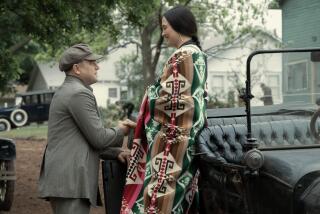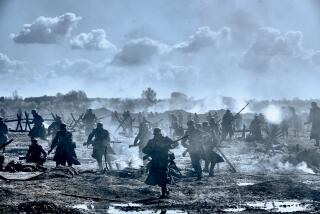Review: Spaghetti western classic ‘The Great Silence’ makes its proper U.S. debut after 50 years
For a brief moment of time, largely during the 1960s, Italian spaghetti westerns shot across the international cinematic sky, making luminaries of directors like Sergio Leone and jump-starting Clint Eastwood’s feature career.
One of the most celebrated of these films was Sergio Corbucci’s 1968 “The Great Silence,” an epic with an eclectic cast — France’s Jean-Louis Trintignant, Germany’s Klaus Kinski and, making her big-screen debut, America’s Vonetta McGee — and a formidable reputation.
Quentin Tarantino, for one, counts Corbucci in general and this film in particular as major influences. His “The Hateful Eight” has a snowy setting similar to this film’s and his “Django Unchained” was inspired by Corbucci’s 1966 “Django.”
Despite all this, “The Great Silence” has never had a theatrical release in this country. Now, courtesy of a 50th anniversary restoration, it is getting that, making it possible to see not only where that reputation comes from, but why this event has been so long in coming.
For while the film’s masterful imagery — this might be the coldest, snowiest western ever — and inventive Ennio Morricone score are spectacular, less audience friendly is a nihilistic, revisionist denouement that apocalyptically subverts the genre’s norms. A double bill with “The Apple Dumpling Gang” is not in this film’s future.
Italian westerns are weird and over the top by definition, and, as team-written in the Italian fashion by Corbucci and three other writers, including his younger brother Bruno, “The Great Silence” is squarely in that tradition.
But if the style is familiar, the visuals definitely are not, and “The Great Silence,” shot in Italy’s Dolomites during what looks to be the snowstorm of the century, starts with a knockout.
A man on horseback is slowly, ever so slowly, making his way through massive snowdrifts that all but bury his horse, and cinematographer Silvano Ippoliti, sensing what he’s got, lets the ride play out as long as he can.
That man would be Silence, an individual who, true to his name, never speaks a word. He’s played by French star Trintignant, who reportedly took the part because he didn’t have to learn any lines.
Silence is a man with a burning hatred of bounty hunters, so much so that he has dedicated his life to riding around the West killing as many of them as he can using a machine pistol so huge its holster has a flip-top lid.
Silence’s methodology is simple: he goads the bounty hunters to shoot first before he himself fires. “He is faster than the devil,” an eyewitness reports. “For all I know he is the devil.”
On the other side of the table is Loco, the most evil and proficient of bounty hunters, played with uncharacteristic reserve by the volatile Kinski.
Almost apologetic about his work (“It’s our bread and butter,” he says), Loco is nevertheless ruthless and sadistic in the pursuit of it, someone who would as soon kill someone as look at them. If there is a price on your head, Loco wants you dead.
It is one of the peculiar conceits of “The Great Silence” that the “criminals” that people like Loco terminate are not criminals at all but members of the West’s proletariat, who have been manipulated into crippling debt by the local plutocrat Henry Policutt (Luigi Pistilli).
Equally helpless is the well-meaning but hapless Sheriff Burnett (Italian western veteran Frank Wolff), who is ordered to the very mythical town of Snow Hill, Utah, to try to create some law and order. Not very likely.
The final part of the dramatic puzzle is provided by Pauline (McGee), quite affecting as a young widow whose husband was a bounty hunter victim and who is desperate for revenge.
Silence, bound by his nature and, as we learn, his history, is determined to provide it, but nothing works out the way these people, not to mention audiences who love classic Hollywood westerns, expect. Not even close.
--------------
‘The Great Silence’
Not rated
Running time: 1 hour, 45 minutes
Playing: Laemmle’s Ahrya Fine Arts, Beverly Hills
More to Read
Only good movies
Get the Indie Focus newsletter, Mark Olsen's weekly guide to the world of cinema.
You may occasionally receive promotional content from the Los Angeles Times.











